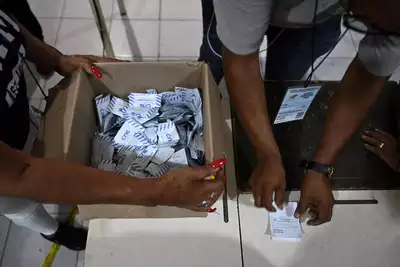
CARACAS, July 29, 2024 (BSS/AFP) - Millions of Venezuelans voted Sunday in a fraught presidential election, with socialist incumbent Nicolas Maduro facing the biggest challenge yet to his party's 25-year hold on power.
Maduro, 61, is seeking a third six-year term at the helm of the once wealthy petro-state where GDP dropped by 80 percent in a decade on his watch, pushing more than seven million of its 30 million citizens to emigrate.
In office since 2013, he is accused of locking up critics and harassing the opposition in a climate of rising authoritarianism.
Independent polls suggest Sunday's vote could bring an end to 25 years of "Chavismo," the populist movement founded by Maduro's socialist predecessor and mentor, the late Hugo Chavez.
But analysts say the president is unlikely to concede defeat to opposition challenger Edmundo Gonzalez Urrutia, who is favored to win by a wide margin.
Gonzalez Urrutia replaced popular opposition leader Maria Corina Machado on the ticket after authorities loyal to Maduro excluded her from the race.
Machado, who campaigned far and wide for her proxy, urged voters to remain at their polling stations "keeping vigil" in the "decisive hours" of counting amid widespread fears of fraud.
"We're praying that they don't steal the election. They always have," voter Mercedes Henriquez, 68, told AFP in Caracas ahead of the vote.
Results are expected during the night.
Maduro, who had previously warned of a "bloodbath" if he loses, said Sunday he would "make sure" the final result from the regime-aligned CNE electoral authority is "defended."
- 'Prepared to defend' -
Rejecting opinion polls, the regime has relied on its own numbers to assert Maduro will defeat Gonzalez Urrutia, a little-known 74-year-old former diplomat.
Maduro counts on a loyal electoral apparatus, military leadership and state institutions in a system of well-established political patronage.
Gonzalez Urrutia said Sunday the opposition was "prepared to defend" the vote and trusted "our armed forces to respect the decision of our people."
He added there had been a "massive" voter turnout.
Polls officially closed after 12 hours of voting at 6:00 pm (2200 GMT).
Ballots were cast on machines which print out paper receipts placed into a container. The electronic votes go directly to a centralized CNE database.
At a polling station near AFP's offices in Caracas, a group of people gathered after closing time, shouting: "We want to count!" outside a shuttered door.
CNE chief Elvis Amoroso, who on Sunday described the opposition as "enemies of Venezuela," accused the movement of "conspiring" to announce incorrect results.
The opposition had deployed some 90,000 volunteer election monitors to polling stations countrywide.
- Watching 'very closely' -
Sunday's election is the product of a mediated deal reached last year between the government and opposition.
As a result, the United States had eased sanctions imposed after Maduro's 2018 reelection was rejected as a sham by dozens of Western and Latin American countries, but snapped them back into place in April.
US Secretary of State Antony Blinken said the international community would be watching the election "very closely."
Washington is keen for a return to stability in Venezuela -- an ally of Cuba, Russia and China that boasts the world's largest oil reserves but severely diminished production capacity.
Economic misery in the South American nation has been a major source of migration pressure on the US southern border.
"It's clear that if Maduro grabs power by force or with violence, we would see an even greater wave in a very short period of time: three, four, five million Venezuelans more leaving," Machado said after casting her vote in Caracas.
"What's at stake here goes beyond our borders, beyond Venezuela."
Most Venezuelans live on just a few dollars a month, with the country's health care and education systems in disrepair and the population enduring biting shortages of electricity and fuel.
The government blames sanctions, but observers point the finger at corruption and government inefficiency.
On Friday, a Venezuelan NGO said Caracas was holding 305 "political prisoners" and had arrested 135 people with links to the opposition campaign since January.
Concerns for the fairness of the vote were further stoked when Caracas blocked several international observers at the last minute.
A small delegation from the US-based Carter Center has been allowed in, as well as a UN expert panel that will issue a confidential report.
About 21 million Venezuelans are registered as voters, but only an estimated 17 million still in the country were eligible to cast ballots.